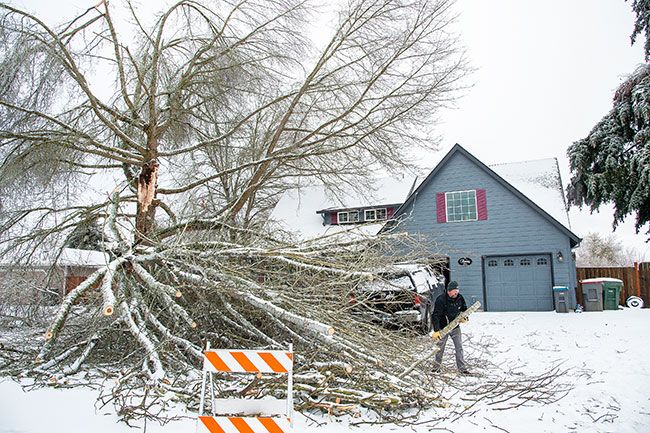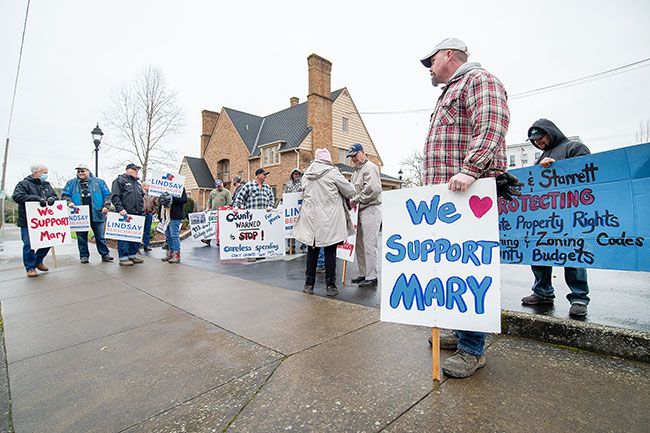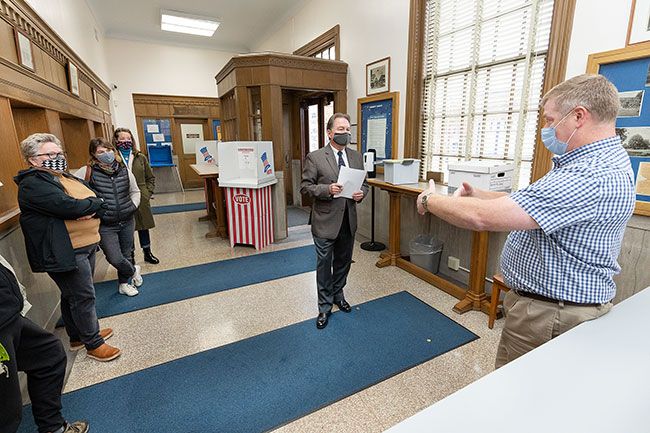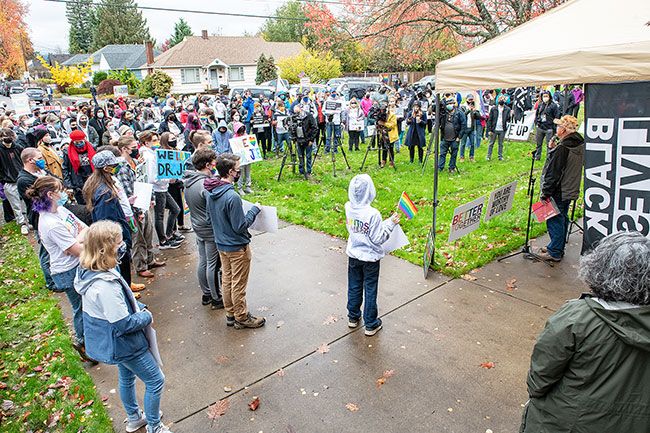2021 In Review Part 2: Normal? Not quite








It was supposed to be the year we took off our masks and breathed a sigh of relief following COVID. And things did start returning to normal, or normal-ish: some annual events came back, albeit in slightly different forms; vaccinations allowed us to dine out again, travel and return to in-person school classes; businesses reopened, at least as much as employee shortages allowed.
Best of all, we were able to turn our attention away from the pandemic, finally, and consider all the other things that happen in our community:
People retire, run for office or face recall. Roads and bridges and buildings get built. Crime continues, unfortunately.
Ice storms, snowstorms and blazing heat cause danger. The dump closes and a trail is put on hold. The creamery burns down. A school board controversy erupts.
Life continues.
Today, the News-Register reviews some of the biggest occurrences and moments of 2021.
[See also: 2021 in Review Part 1: Vaxes and variants]
Weather runs hot and cold
While it wasn’t the holiday season, Yamhill County residents could have just as easily been singing to themselves, “The weather outside is frightful,” in February. And again in June, too.
Mother Nature made her presence felt on multiple occasions in 2021.
Temperatures plummeted Thursday and Friday, Feb. 11 and 12, as freezing rain fell, coating the county with ice.
As the thermometer hovered in the high 20s, ice-laden branches bent and broke. Trees toppled, some taking power lines with them. Power was knocked out. Roads were closed.
Rural areas took a big hit. Yamhill County Road Division Manager Steve Sims described a stretch of Wilsonville Road, including Willamette Greenway State Park, as a “disaster.”
About 2,500 McMinnville Water & Light customers were without power at the height of the storm.
More than 350,000 Portland General Electric customers were powerless. There were almost 7,000 local customers.
The utility reported 4,408 power lines were brought to the ground by the storms. Substations were also impacted.
Several months later, three rounds of record-setting heat baked the county.
In late June, the temperature soared to 114 degrees. Another blistering heat spell followed during the final week of July. More scorching temperatures were felt in mid-August.
People took advantage of cooling shelters throughout the county. The McMinnville First Baptist Church, Yamhill County Gospel Rescue Mission, McMinnville Public Library, West Valley Fire District in Willamina and other sites added to the supply of cooling centers.
In late August, the Yamhill County commissioners declared a state of emergency for the county to position it for severe drought.
Nearly every county west of the Rocky Mountains was drought-stricken at the time and had been for months, the vast majority either extreme or exceptional.
All of Yamhill County was in severe drought, along with the rest of the Willamette Valley; most of the state was in extreme or exceptional drought.
The emergency declaration, which asked the governor to also declare an emergency for the county, was intended to help access state and federal resources, if they were needed.
It was a snowy scene across Yamhill County as the year concluded.
A low pressure system and strong cold front moved through the Pacific Northwest on Christmas evening and through the following day.
The storm brought a significant amount of snow to the Pacific Northwest, especially to the Cascades.
The showery nature of the snow did bring heavier snowfall to some of the lowland areas within the southern and central Willamette Valley.
Yamhill recorded a six-inch snowfall, four inches were measured in McMinnville and 3 1/2 in Newberg at about 8:30 a.m. the day after Christmas, according to National Weather Service records.
The temperature during the day and night at the height of the storm and in the days following dropped below freezing.
McMinnville and the county public works departments responded to plow and sand roadways in an effort to keep them as safe as possible for vehicular traffic.
Fire destroys creamery
Black smoke billowed into the blue sky on April 20 as the Organic Valley Creamery in McMinnville burned to the ground.
Ruled an accident, the afternoon fire was one of the biggest in McMinnville’s history. It led to evacuations of the area near the Highway 99W plant and early dismissal of schools.
And it destroyed decades-old but freshly remodeled buildings and stalled dried milk and butter production at Organic Valley’s only West Coast plant.
Nearly 100 firefighters from 10 agencies poured 800,000 gallons of water onto the flames. They kept at it over several days as persistent hot spots continued to burn, some of them fueled by stored butter.
The blaze caused an estimated $50 million in damage. No one was injured in the blaze, and Dayton firefighters even managed to rescue the American flag that hung above the entrance to the creamery’s main office.
It left Organic Valley, a Wisconsin-based company, wondering where to build a new plant. Company officials said they had to consider a variety of sites, not just McMinnville, to serve Oregon and Washington organic dairies.
In October, almost exactly six months after the devastating fire, Organic Valley announced its decision: It is rebuilding in McMinnville.
Earth movers began preparing the site this fall and construction started in November.
The decision to rebuild here was hailed by city officials and local residents, including 47 who had been employed at the plant.
Organic dairy owners — 27 in Oregon and more in Washington — agreed. Before the fire, the McMinnville plant had been processing four million pounds of their milk each week; since then, they’ve been sending it to other states.
A milk processing plant has been part of McMinnville for many decades. In fact, much of the city has grown up around the former Farmers Co-op Creamery, which was purchased by Organic Valley in 2016 and reopened as an organic creamery in 2017.
Coming in 2022: Organic Valley plans to open Phase I of its new McMinnville plant in March and the second phase in 2023.
Year of the recall effort
It has been the year of the recall effort, with four currently underway across the county.
Newberg School Board members Dave Brown and Brian Shannon will face a recall election in January, and signatures are being gathered against County Commissioner Lindsay Berschauer and West Valley Fire Board member Michael Alger.
In August, the group “Save Yamhill County” filed a recall petition against Berschauer, who took office in January, after her election campaign was heavily funded by farmers opposed to the Yamhelas Westsider Trail.
Constituents became upset, not only at Berschauer’s vote to end the county’s years-long work on the trail, necessitating repayment of thousands of dollars in grant funds, but also her treatment of county staff and other actions.
Over the past year, Berschauer and Commission Chair Mary Starrett passed a gun “sanctuary” ordinance the state is challenging in court; promoted misinformation about the COVID-19 pandemic, masks and vaccines; demanded without authority the city of Newberg hold a $70,000 election on an urban renewal district plan, and failed to disseminate funds from the American Rescue Plan Act.
The recall effort was endorsed by the county’s largest union, the Yamhill Employees Association, and by the Marion, Polk Yamhill Central Labor Chapter (MPYCLC), and three former county commissioners, Mary Stern, Stan Primozich and Rick Olson.
The group gathered nearly 9,000 signatures, but 1,500 were rejected because of a clerical error. The remaining signatures failed to meet the required threshhold of 6,873. Undeterred, the group started over. Signatures are due to the county clerk’s office by Feb. 16.
In Newberg, four members of the school board seized voting control this year. Two new members, Renee Powell and Trevor DeHart, joined members Dave Brown and Brian Shannon to outvote members Brandy Penner, Ines Peña and Rebecca Piros on matters of racial justice and equality.
The board rescinded an “All Students Belong” policy and banned Black Lives Matter and Pride flags in schools, generating public outcry and threats of lawsuits. The ban was eventually revised to include all flags and symbols considered “political, quasi-political or controversial,” which staff said was too broad to be enforceable. Racist actions by some students and by a staff member added to the public’s outrage.
In November, the board fired without cause district Superintendent Joe Morelock, widely credited with bringing the district back from the edge of financial run.
Petitions against Shannon and Brown were successful, and a recall election is scheduled for Jan. 18.
Two district administrators and the board secretary have resigned. The four board members are facing three lawsuits and are suing a group of their constituents.
In mid-December, the board hired a consultant to recruit a new superintendent by January. However, he withdrew his proposal the next day.
In Willamina, the entire staff of the West Valley Fire District resigned over several months after an agreement to merge with the Sheridan and the SW Polk Fire District failed.
Former Chief Fred Hertel announced on Facebook that at the Dec. 16 fire board meeting Board President Chris Greenhill resigned and the board voted to contract with the Confederated Tribes of Grand Ronde. He said the board also voted to have Director Michael Alger and Rick Mishler negotiate a contract for an interim chief, and to table consideration of a contract offer from the Sheridan Fire District.
Hertel has blamed a combination of factors for the resignations, including “uncertain direction from the board of directors and relatively low wages.”
In October, resident Patty Brooks filed to begin gathering signatures to recall Alger. Signatures are due by Jan. 12.
Alger failed to understand his fiduciary duties, failed to support staff and supported a district agreement that “has cost us service and financial stability,” Brooks wrote in her petition.
Yamhelas Trail project ended
The Yamhelas Westsider Trail, a project the county has been working on since 2012, was officially ended early in 2021, although proponents have continued to plead with county commissioners to find another way to allow it. Dozens of county residents have written to the board over the past year, asking the commissioners to reconsider.
The trail was hotly opposed by a group of farmers who live adjacent to the proposed route and, in some cases, own land on either side of the former railroad corridor. They spent years filing appeals with the state Land Use Board of Appeals, arguing that the trail would harm their ability to spray herbicides and pesticides on their crops.
In 2019, when Republican Lindsay Berschauer filed to run for county commissioner, farmers opposed to the trail heavily funded her campaign. Berschauer followed through, bringing a second vote to the board to back longtime trail opponent Mary Starrett’s nay vote, leaving Commissioner Casey Kulla the lone vote in favor of continuing the project.
Berschauer didn’t stop there: She aggressively and repeatedly suggested malfeasance on the part of county employees who had worked on the trail under the direction of previous boards of commissioners. One employee she criticized has retired, and another filed a hostile workforce complaint. It was ultimately found unsubstantiated, however, because the attorney who investigated it told county officials, “there are no existing County ordinances applicable to allegations against a sitting Commissioner regarding harassing, bullying, defamatory, libelous, and/or abusive behavior towards staff.”
Any such ordinances would have to be created by the commissioners themselves.
Prohibitions against harassment in the county’s employee handbook, which the attorney also looked at, are specific to sexual harassment, and therefore not applicable to Berschauer’s behavior, the attorney concluded. The attorney said she was also unable to substantiate the employee’s belief that Berschauer was attempting to have the employee fired.
The county released an executive summary of the attorney’s findings, but refused to release the full report. County Counsel Christian Boenisch told the News-Register that the county did not obtain a copy of the full report, but had merely reviewed it with the attorney.
With the trail project officially ended, the state Department of Transportation and Parks Departments demanded that the county repay the grants it received for the project; a total of $743,782.
Initially, Starrett and Berschauer demanded that the Oregon Department of Transportation help to repay a grant for a bridge across Stag Hollow Creek. Berschauer claimed that ODOT officials should have known the county would not finish the bridge, and therefore bore some of the financial responsibility. ODOT refused, and demanded full payment.
The bridge was partially built, but the county contracted with the construction company, Farline Bridge Inc., to remove it, and agreed to pay some $35,000 for the work, after Farline bought back $71,332 worth of materials.
The Chehalem Parks and Recreation District told the county it wanted to purchase the trail corridor and build the trail itself, but commissioners have not so far been amenable to the idea. Berschauer suggested the land could be sold or leased to the adjacent farmers, but the county has not yet made any decisions.
Over the summer, the Chehalem Parks and Recreation District conducted a survey of county residents that showed that many had not heard of the trail, but expressed support for it, once it was explained to them. The survey showed that 64% of respondents supported the trail; 16% opposed it, and 20% were undecided.
Gun sanctuary ordinance OK’d
Yamhill County drew attention statewide in 2021, for first passing an ordinance declaring the county a “sanctuary” from new state and federal gun regulations and then being sued for it by the state. That lawsuit is still pending.
The ordinance bans sheriff’s deputies from enforcing state gun regulations passed after February 2021, and bans the use of county resources to prosecute violations of new gun laws. It says that county employees who attempt to enforce them can be subjected to private lawsuits.
County Commissioners Lindsay Berschauer and Mary Starrett, whose brother, Kevin Starrett, is the director of the Oregon Firearms Federation, held several discussions in February and March, before passing it in a two-to-one vote, with Commissioner Casey Kulla voting in opposition.
The ordinance was modeled after ones approved by voters in Umatilla and Columbia counties in 2020.
County Counsel Christian Boenisch warned that the ordinance appears to violate state law banning local pre-emption of gun regulations. However, Starrett and Berschauer dismissed his warnings, arguing that other Oregon counties had not been sued for passing similar ordinances.
The Oregon Firearms Federation solicited comments on the ordinance statewide, and provided a pre-written letter bot, generating some 1,200 letters from around the state. About 27 letters in support were from people who identified themselves as county residents. County Administrator Ken Huffer complained to commissioners that his staff was overwhelmed by the deluge.
The county also received more than 100 letters in opposition to the ordinance, most of which appeared to come from county residents.
The ordinance states that the sheriff and district attorney “retain all prosecutorial, enforcement, or administrative discretion and authority that the Sheriff or District Attorney would otherwise have under federal, state, or local laws so long as said discretion and authority is exercised consistent with the legislative directives of this ordinance.”
District Attorney Brad Berry and Sheriff Tim Svenson asked to have the last phrase removed. Berschauer had agreed to remove it, but added it back in a last-minute revision on a day when neither were available to comment, and the ordinance was passed with the provision in place.
In late September, the Oregon Department of Justice filed lawsuits against Yamhill and Harney counties.
“Gun safety laws exist to help keep guns out of dangerous hands and keep people safe. A county commission simply doesn’t get to override state law in this way,” state Attorney General Ellen Rosenblum said in her announcement about the lawsuits.
“The laws of Oregon remain fully in force — and fully enforceable — notwithstanding these invalid ordinances. No officials should be frightened out of properly doing their job by the threat of illegitimate criminal charges or bogus lawsuits,” Rosenblulm said. “Although today’s lawsuits are addressed to only these two Oregon counties, other counties have enacted similar illegal ordinances. These actions will hopefully send the message that we are prepared to preserve the rule of law across our state.”
In October, commissioners hired Lake Oswego attorney Tyler Smith, who wrote the original ordinance Yamhill County’s was based on, to defend the county in court, at a rate of up to $325 an hour.
Smith advised commissioners during their deliberations over the ordinance, and encouraged commissioners to approve it.
After receiving pressure from written comments and on social media, Berschauer acknowledged that Smith is married to her ex-husband’s cousin, but denied that the relationship posed a conflict of interest.
Kulla, who voted against hiring Smith, told the News-Register at the time that defending the lawsuit against the county is “financially and logically irresponsible: the cost of defense comes straight out of our budget for defending a blatantly illegal and unconstitutional ordinance.”
Seeking state, national office
Yamhill-Carlton High School graduate and former New York Times columnist Nicholas Kristof and Yamhill County Commissioner Casey Kulla announced their candidacies for Oregon governor.
State Rep. Ron Noble and Dundee Mayor David Russ confirmed plans to run for Congress in the newly established District 6.
Kristof, a 1977 Y-C High School graduate, confirmed in October what he had been considering for weeks, with an appearance outside a Portland church.
“I believe we can do better,” he said.
Kristof stressed education reform, underscoring the need to improve pre-K and early intervention programs, and his goal of developing green industries through the formation of what he termed a “climate tech hub.”
He said he has no aspiration to be a career politician.
“I’m not trying to climb some career ladder. What I want to do is solve problems that I see are holding back this state, holding back people I care very deeply about.”
Kulla said he feels Oregon needs a leader with the experience of a county commissioner, farmer and scientist.
A resident of Grand Island, Kulla was elected to the county board of commissioners in 2018 and is serving his first term in elected office.
He and his wife have been farming in the county since 2006, growing organic produce, seeds and, more recently, marijuana.
Kulla said he wants to find a way to heal divisiveness, protect democracy, respond to the repeated natural disasters exacerbated by climate change, and make state agencies more accountable to residents.
Kulla said he’s been meeting with people from around the state, and believes that “We have the same problems but they look different in each community, and we have a lot of the same values, but how it shows up in each community is different.”
He said he believes his role would be to bring people from different sides of issues, to find solutions.
The newly formed District 6 includes Yamhill and Polk counties, along with parts of Marion, Clackamas and Washington counties.
Previously, those areas were divided between Suzanne Bonamici, a Democrat representing District 1 to the north, and Kurt Schrader, a Democrat representing District 5 to the south.
Noble, who served as chief of the McMinnville Police Department from 2006 to 2014, then headed the campus police force at Linfield University, is serving in the state House of Representatives. Before being hired by McMinnville, he served as a lieutenant with the Corvallis Police Department.
He lists his priorities as public safety, economic development, transparent government and local control of education. He served as vice chair of the House Judiciary Committee’s subcommittee on equitable policing and worked with Democrats on a package of police reform bills.
Russ, a realtor, will serve as Dundee mayor through December 2022, with hopes of heading off to Washington, D.C., at that time.
An Eastern Washington (Cheney) University graduate, he has 25 years of corporate executive experience.
On his website, Russ states he will support and defend the U.S. Constitution, Bill of Rights, farmers, ranchers and foresters, small business, the right to hold and bear arms, state rights and sovereignty and secure borders and immigration law enforcement.
Landfill closes to garbage
Riverbend Landfill, owned by garbage company behemoth Waste Management, abruptly stopped accepting garbage and recycling in June after more than a decade of being on the losing end of appeals as it sought to obtain an expansion permit.
Waste Management is the largest garbage company in the United States.
The company provided just one day of warning to local garbage haulers, but agreed to give residents and businesses hauling their own trash and recycling a week to bring in any last loads.
The county initially approved the permit, but the state Land Use Board of Appeals and eventually the state Supreme Court, nixed the decision, saying the county had failed to provide for sufficient mitigation of the harm the expansion would cause to neighboring farms. The decision was remanded to the county for further efforts, appealed again and made its way to the state Supreme Court, before the county denied the permit in August of 2020.
Riverbend appealed, unsuccessfully.
However, the company stressed that it was not officially closing, and still hopes to expand eventually.
In July, county commissioners granted Riverbend a 15-year extension of its contract and a reduction in the annual fees it pays to the county, from $200,000 to $50,000 over three years, after refusing a request by county commissioners to at least continue providing some limited services to residents of the West Valley, allowing them to drop off their garbage and recycling.
The vote was two to one, with Commissioners Mary Starrett and Lindsay Berschauer voting in favor, and Commission Casey Kulla in opposition.
Kulla had argued in favor of granting the company a one-year extension, and retaining the same payment level.
In October, the Environmental Protection Agency fined the company $104,482 for its violations of the Clean Air Act, and ordered it to enhance its monitoring procedures, under terms spelled out in a court document.
The EPA said that for at least the past five years, Riverbend had been violating the Clean Air Act and failing to properly monitor surface emissions and landfill cover to ensure that methane and other gases were not leaking into the atmosphere, and failed to perform required monitoring of a test well.
Upheaval at Linfield
In a season of cautious return to public events despite the continuing pandemic, Linfield University was a lively place in the fall of 2021. Homecoming was well-attended though scaled-back, the university theater saw packed houses for its first live shows in 20 months, and audiences heard vibrant vocal and instrumental programs in Melrose Hall and the Vivian Bull Music Center.
“We are honored and pleased to be able to perform this music for you,” choral director Anna Song told the audience, while acknowledging that the traditional audience sing-along was canceled.
The 2020-22 COVID years had their effects on Linfield, while other pressures prevailed. The ongoing scrutiny of prominent past and current Linfield University officials and staff members remained in the news — internationally — throughout 2021, as the school dealt with allegations pertaining to how the school responded to student and faculty concerns about campus sexual harassment, as well as antisemitic comments allegedly made by two Linfield officials.
In a long-awaited decision, former Linfield trustee David Jubb was sentenced in November to community service as all but two sexual assault charges were dismissed in November, and former Linfield student AnnaMarie Motis settled out of court for a reported $500,000 in her civil case against Jubb, who pleaded no contest to two counts of sexual harassment in Yamhill County Circuit Court in late October. Pleading no contest to the Class A misdemeanors means that Jubb accepts the convictions but avoids a factual admission of guilt on each charge.
Daniel Pollack-Pelzner, 41, an English professor with 10 years’ tenure at Linfield, was fired in April, having served as the school’s faculty representative on the Board of Trustees.
Linfield fired Pollack-Pelzer after he repeatedly called upon university leadership to address reports by students and faculty of sexual harassment by university trustees and the president. (In 2021 Pollack-Pelzner became a visiting scholar in Shakespeare studies with Portland State University.)
In July, Daniel Pollack-Pelzner filed a complaint with Oregon Circuit Court in Multnomah County, accusing Linfield of unlawful whistleblower retaliation and other claims for the school’s alleged actions against him. Among other allegations, Pollack-Pelzner asserts that the board suppressed a critical report he had asked be circulated to the rest of the Trustees.
The lawsuit specifically named the university as sole defendant, but cites alleged antisemitic comments and sexual harassment either committed by or allowed by President Miles K. Davis and other administration and Board of Trustees members, including Board Chair David Baca.
In early 2021, Linfield’s faculty senate expressed lack of confidence over the administration’s handling of sexual-misconduct allegations. Within days, Pollack-Pelzner was out of a job.
Baca, an alumnus and 13-year member of the Board of Trustees for Linfield University, stepped down as chairman in September. He remains on the board.
In the Aug. 13 edition, the News-Register reported: Linfield University responded with near total denial of allegations to the lawsuit filed last month by Pollack-Pelzner, calling it “frivolous, unreasonable and without foundation.” Pollack-Pelzner’s attorney, Dana Sullivan of Portland, said it was “discouraging” the university has filed counterclaims in Circuit Court.
Part of Pollack-Pelzner’s suit claims that Baca had been dismissive of Pollack-Pelzner’s calls for board and university reform concerning sexual harassment complaints on campus, specifically questioning the university’s adherence to its own policies about board of trustee conduct. Pollack-Pelzner also alleged that Baca as well as Linfield President Miles K. Davis made comments to him that he described as antisemitic.
What to look for in 2022: Documentation from both parties in the Pollack-Pelzner vs. Linfield suit will likely continue for another 12-16 weeks, with motions expected having to do with eligibility of evidence (discovery); deposition of witnesses could start as early as three months.
Newberg board sparks outcry
Elections for the Newberg School Board drew little attention in 2019 and less in 2020. But the board shot to national attention in July of this year, when four conservative members who had been elected in those years seized control of the board, consistently outvoting the other three as they sought to implement their own agenda. The four members, Brian Shannon, Dave Brown, Renee Powell and Trevor DeHart, have drawn the ire of much of the community, although some parents and community residents have spoken out in support.
In July, the board announced it would add to its August agenda consideration of proposals banning Black Lives Matter and Pride flags in its buildings, rescinding or revamping an anti-racism policy and reconsidering the “all students belong” policy passed last December.
Newly elected vice chair Shannon sought to have all three matters passed at the July meeting, but failed when the secretary pointed out that his motions to pass them violated Oregon Public Meetings law, because the board had not previously announced its intentions to the public.
Public outcry was fierce, including from students, but the board passed all three measures the following month. Two different law firms called the ban illegal, and threats of lawsuits, the board initially held to its position. However, in October it rescinded the ban and replaced it with a more generic ban on all political, quasi-political or controversial signs and symbols, a ban so broad that teachers and officials complained it was virtually meaningless.
In the meantime, ugly events drew more nationwide attention, as a student was found participating in an online “Slave Trade” game in which students pretended to sell their Black classmates and made racist comments, and a teaching assistant came to school in Blackface, claiming she was trying to draw attention to her objection to a statewide mask mandate.
Events continued to snowball, as the four board members were accused of meeting in secret, violating Oregon Public Meetings law, hired an attorney in what appeared to be a violation of Public Meetings Law, and fired the popular district superintendent Joe Morelock, without cause, in November. Morelock has been widely credited with rescuing the school district from the edge of financial ruin and bringing stability, as well as improving teacher salaries and bringing in other improvements.
In September, a group of local activists filed a recall petition against Shannon, seen as the ringleader of the four conservative members, and in November, filed one against Chair Dave Brown.
At least three different lawsuits have been filed against the four; two in state court and one in federal court. They, in turn, have sued a group of constituents, claiming they had doxxed school board members.
The board secretary resigned after Morelock was fired. Since then, the district’s assistant superintendent and one of its school principals have resigned.
This month, the recall groups submitted the signatures they had gathered to the county clerk’s office, and both were found to have qualified for the ballot. A recall election is scheduled for Jan. 18.
On Dec. 14, the board hired a consultant to conduct a hurried search for a new superintendent, but he withdrew his proposal the following day. The board is scheduled to consider its next steps at its Jan. 11 meeting.
Highway and bridge work
Major highway projects at the north and south ends of McMinnville, and in the town of Lafayette, resulted in repeated traffic delays in 2021, somewhat less on the South Yamhill River bridge.
May to November saw repeated lane closures and traffic delays between McDaniel Avenue in McMinnville, northeast to the town of Lafayette. Oregon Department of Transportation crews spent months paving and striping Highway 99W, replacing and upgrading sidewalks, upgrading curbs and drainage, and installing new crosswalks and pedestrian crossing signal devices, in addition to bringing pedestrian access up to Americans With Disabilities Act standards. Paving and intersection improvements were also made at Mineral Springs and McDougall Roads.
The largest impacts in the Highway 99W project, however, affected the town of Lafayette, where traffic flaggers worked a number of 24-hour periods in coordination with crews pulling out old asphalt and installing new curbs, sidewalks and pedestrian “bulb-out” crossings and signals. The dominant work saw crews do what ODOT termed “the dig out” — excavating first the east-bound lane of 99W, and then the west-bound. The support layers under the asphalt had settled or deteriorated due to wear and water intrusion, leading to potholes, cracking and other surface damage. The road had to be excavated 6-8 feet down, and the layered subgrade replaced with new material, or ballast. Long delays for in-town as well as through traffic resulted from the one-way traffic pattern, and 99W driveway access and some side streets had to be closed to give crews room to move and to control traffic access onto 99W. That led to more delays and frustration for local residents and merchants, as some street closures at times made it impossible for vehicles or pedestrians to the doors of businesses.
“Business is down about half. It’s terrible,” said Mike Yoon, owner of Peoples Market for 20 years, in July. ODOT senior engineer Vidal Francis said that throughout the summer ODOT responded regularly to merchants’ concerns, adjusting closure times or placement of barriers.
The work, other than isolated concrete work and other tasks at selected corners, was done by early November; the final detail, installation of the pedestrian signal at 99W and Monroe streets, is scheduled for sometime in the last week of the year.
By mid-December, evidence was clear that the Highway 99W project was winding down. Hundreds of orange barrel-shaped traffic barriers and striped “road closed” signs were tightly stacked up in a closed-off area along Highway 99W near the Lafayette Avenue intersection. Contractors, required by ODOT to move the traffic control items out of the way until more work continues this spring, took the material away for storage.
The other significant ODOT project in the area — replacement of the South Yamhill River bridge — started in spring 2021 and continues in earnest in 2022, with completion expected in 2024. Wildish Construction is lead contractor on the project, which currently features construction alongside the old bridge of a temporary, asphalt-surface bridge expected to open in March 2022. Traffic will use the temporary bridge to get from Third Street out to Three Mile Lane and Highway 18 and back. Demolition of the bridge will begin this spring.
What to watch for in 2022: Periodic traffic delays on the South Yamhill Bridge project to start as soon as Jan. 3-4 as new equipment is delivered to the bridge and mobilization area. On Highway 99W, warmer, drier weather in April or May will enable resumption of final paving and striping, and overhead electrical work east of McDonald Avenue. Much of the road between McDaniel and Lafayette avenues will get an additional layer, and final striping, when weather permits this spring.
Changes at Mac schools
After 19 years leading the McMinnville School District, Maryalice Russell retired from the superintendent’s job in June.
She joined the district in 2002 and led changes and improvements that increased graduation rates and lowered the number of students dropping out.
McMinnville High School became a leader in the number of students earning college credits while still in high school. It also increased its number of career pathway programs and added the Engineering and Aviation Sciences Academy, which met in the Evergreen Space Museum until 2019, when dedicated EASA classrooms opened at Mac High.
The two-phase construction project, part of a 2016 bond measure, also remodeled the library, built a new gym, other P.E facilities and a career-tech center, and made other schools in the district safer and more energy-efficient.
In 2006, Russell also led the effort to pass a bond that added classroom wings to Mac High and several elementary schools, adding much-needed capacity for students.
Russell was named Oregon superintendent of the year in 2012. Several principals and other administrators received state honors during her tenure and one, Cathy Carnahan, was named national middle school principal of the year.
In early 2021, school board members conducted a nationwide search for her replacement. In March, they hired Debbie Brockett from the Las Vegas school system.
Since she took over the district July 1, Brockett has been getting to know district staff, parents and community members — in addition to leading the return to in-person classes for students for the first time since the coronavirus pandemic started in March 2020.








Comments